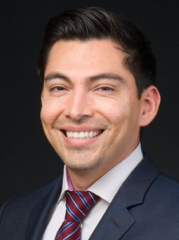
Dr. Efrain Talamantes received his bachelors of science in psychobiology at UCLA, and medical degree from the David Geffen School of Medicine at UCLA, and obtained a master’s degree in business administration at the Emory Goizueta School of Business. He subsequently completed his Internal Medicine Residency training at the University of California, Davis where he participated in the Transforming Education and Community Health (TEACH) program, a primary care training program focusing in caring for the medically underserved. Dr. Talamantes will begin his Robert Wood Johnson Foundation Clinical Scholars fellowship training at UCLA in the summer of 2012. His research and policy interests include the implementation of new system-level models of care to enhance coordination of care for underserved populations.
What is your current profession and how did you get there?
I am currently an internal medicine physician at UCLA in their hospitalist division. Internal medicine is still a foreign concept to my family and friends. They often think “I’m a doctor, but I don’t see women and children.” This is not entirely true, except for the fact that I really do not see any children in my practice. Once an adult shows up to the emergency room with a medical problem and they need further medical care an internal medicine physician will take care of them in the hospital. My patients may have their internal organs such as their heart, lungs, stomach and intestines, kidneys, and liver affected by a disease process that if not halted or reversed may cause serious health problems. Working at UCLA allows me to take care of patients, train future physicians, and work on research that will advance the way we take care of our patients. I grew up in the city of Norwalk, California and I am the oldest of three children. My parents grew up in a poor rural farming community in Jalisco, Mexico and struggled with poverty and were only received a 2nd grade school education. My parents immigrated to the United States in hopes of providing us with a better future, and most importantly the opportunity to get an advanced education. I grew up in a small 2 bedroom household with up to 15 people living with us at any given time. School was a great outlet and I took advantage of it because I understood how hard my family had to work to make ends meet. The catalyst for my success has been others believing in me and providing me with the tools necessary to grow as a person. I credit my family, friends, teachers, mentors and countless outreach programs that recognized my potential and never let me give up. I never thought about becoming a physician during my childhood or teenage years because I spent a considerable amount of time working with my family in the landscaping and dry cleaning business. As the first in my family to graduate from high school, and go to college I was given the opportunity to explore various career options. Through volunteer opportunities I found my passion in providing patients comfort in understanding how to best prevent diseases such as diabetes, hypertension, and promote a healthy way of living. Taking on the challenges of science courses and standardized test was fueled by the notion that not all Americans have access to quality health care.
What impact did the COPE Health Solutions educational programs have on your career and professional development?
One of the harsh realities I faced while an undergraduate student at UCLA was the reality that I was one of the few students who came from a low socioeconomic and Latino background. I found it challenging to find purpose in my daily coursework because I was home sick. COPE Health Solutions allowed me to participate in a public health course that gave me the tools and opportunity to go back to a community similar to the one I grew up in and help at-risk youth. Working with other UCLA students and public health faculty on community issues gave me a real sense of direction and drive. I soon began to find purpose in all my courses no matter how dull and redundant because I could finally visualize the end goal. COPE Health Solutions allowed me to stay connected to my community, gave me the tools I needed to better serve them, and inspired me to learn for the sake of others. COPE’s community based approach of finding ways to bring about change has forever changed my perspective on how to tackle the challenges I face everyday as a physician.
What advice do you have to current COPE Health Solutions program participants?
As a COPE participant it is easy to loose perspective on why you have chosen to pursue such a rigorous and demanding field. I remember feeling like I failed even when I gave it my all. Take it one day at a time and be patient with yourself and others. Don’t be shy and ask questions, COPE is a great mentorship network to help you learn more about your own needs, talents, and achieve your life goals while giving back to your community.
*This spotlight was written in 2013. Dr. Talamantes is now Medical Director of Hospital Medicine at Martin Luther King, Jr. Community Hospital